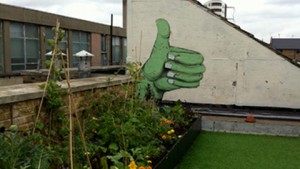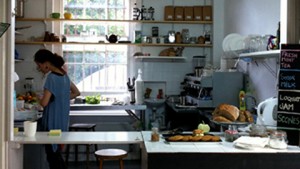‘Dalston Green Zone’ has become the new name of the area around Dalston Junction. After a summer where urban farming has spread from shops to rooftops and local markets, the area has become a hub for aspiring urban-farmers and a positive addition to the community.
The United Nation’s Food and Agriculture Organisation recently issued a statement warning that the rapid growth of the worlds 25 megacities would result in the cities experiencing severe food-shortage and problems with feeding themselves. London is not amongst the worlds top 20 megacities, but it isn’t far behind, which is just one of the reasons Londoners are exploring new and alternative ways to sustain them selves.
Kirsten Cheng, manager of the Farm:shop on Dalston Lane, explains: “Urban farming is about more than just homegrown tomatoes. People have forgotten where food comes from and getting involved in urban farming brings you back to reality, it is so satisfying and something way beyond a trend.”
With its ‘aquaponic’ micro fish farming, indoor allotment and rooftop chicken coop, the Farm:shop is almost completely self-sustainable and leaves a minimum carbon footprint. The shop, which opened in November 2010, works as an urban farm, a shop and a café, where everything you order is grown in the shop.
Guy Nicholson, Hackney Council Cabinet Member for Regeneration and the 2012 Olympic and Paralympic Games, said: “Farm:shop captures the essence of Dalston as a place where passions for art and culture mix with efforts to improve the environment. Farm:shop creatively uses an empty space for a positive means. The Council will continue to support projects like this.”
However, the Farm:shop is just one of the many urban farming projects that has contributed to the wave of green initiatives in Dalston.
Zachary Butcher is project developer of Dalston Roof Park, an allotment and rooftop garden project, which is located just around the corner from the Farm: Shop on Ashwin street. He says: “The challenge of turning an unconventional space into a green environment is one of the aspects that has turned the locals on to urban farming.”
Butcher continues: “The alternative use of the spaces makes you realise that you can use anything, your back yard, your rooftop or a windowsill – it is about realising the potential.” This statement is echoed by Cheng, who adds that the “pop-up” atmosphere in the area has motivated people to start alternative projects like the Farm:shop and Dalston Roof Park.
Dalston Roof Park is part of the organisation Bootstrap Company, which has existed since 1977. Bootstrap and Dalston Roof Park aim to make sure that the local community becomes more sustainably prosperous. All summer, the roof has functioned as a garden, workshop space for local kids, music venue and bar. Bootstrap is also the owner of London’s biggest solar power installation, which provides electricity to the studio and office spaces in the building.
Last year Butcher put an advert in the Hackney Gazette looking for tenants for the newly-opened allotment project and was instantly swamped with enquiries and applications.
Butcher says: “I was quite surprised about the amount of responses. When I was a child going to the garden was boring, but today it seems to draw people in.”
However, the rise in east London urban farming is not without criticism. The quality of the locally grown vegetables distributed via various vegetable box schemes have been questioned and people are quite sceptical about the life of the roof chickens.
Butcher explains: “I might not get an organic certificate, but you do the best you can by using organic growing bags, no chemicals etc. but essentially people do it for themselves.”
Cheng says: “People come into the shop and say that they get in touch with things they don’t normally do when living in the city.”
Living in a city like London, the distance to green spaces can be far and it is easy to forget how nature works and where the food you eat come from.
According to Butcher, getting involved in urban farming helps to break down the “false food stereotypes” that have been formed after years of people buying food wrapped in plastic and ready-meals from the supermarket.
According to a report by SUSTAIN, The Alliance For Better Food and Farming, urban farming activities create a way for low-income groups to get access to fresh fruit and vegetables, along with many of the other benefits such as contributing to household food security and nutrition. With Hackney being one of London more deprived areas, projects like these seemed to be especially well placed and beneficial to the community.
Both Cheng and Butcher agree that this particular type of urban farming is valuable in creating awareness, motivation and inspiration for people to do similar things at home and hopefully in due time be able to create a network of local urban farmers who can contribute to the Farm:shop, vegetable box schemes or the Stoke Newington Farmers Market – a mix of ultra-local producers selling bread, cakes and other specialities and farmers within 129 miles of Hackney. The Market is run by the organisation Growing Communities, that also runs a vegetable box scheme.
Inevitably for this area, Dalston Roof Park has also had its fair share of “20-30-year-old ‘trendies,’” especially now that living green and healthy have become fashionable, claims Butcher.
Because of the location of the projects, people easily jump to the conclusion that this is just another Dalston/Hackney fad and the interest from the creators and users will quickly wither. However, the community and therapeutic aspect of urban farming brings it beyond trend.
Butcher explains: “Many of our allotment owners are either retired or recently made redundant,” adding that that the allotments give them something to do and also work as a great place to socialise and meet people. For Butcher and Bootstrap bringing the community together has been an important aspect of Dalston Roof Park from the beginning.
Cheng adds: “Without sounding like a lunatic, seeing a seed you planted grow into a real plant, watering and nurturing it is incredibly gratifying and therapeutic. You really get in touch with your basic instincts, which in some way helps you calm down and process a busy day better.”






